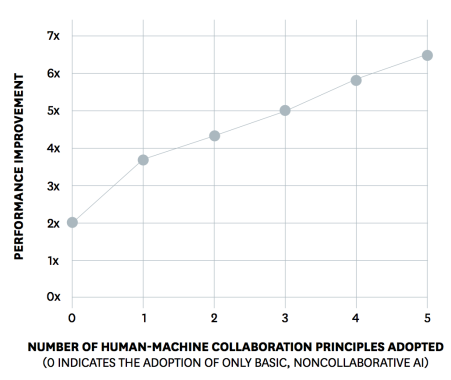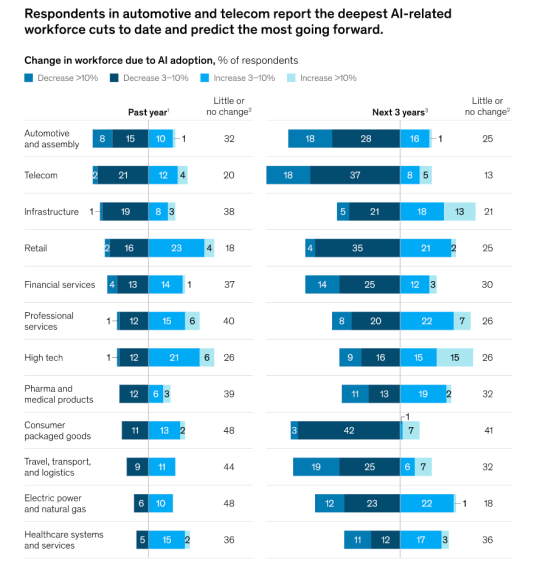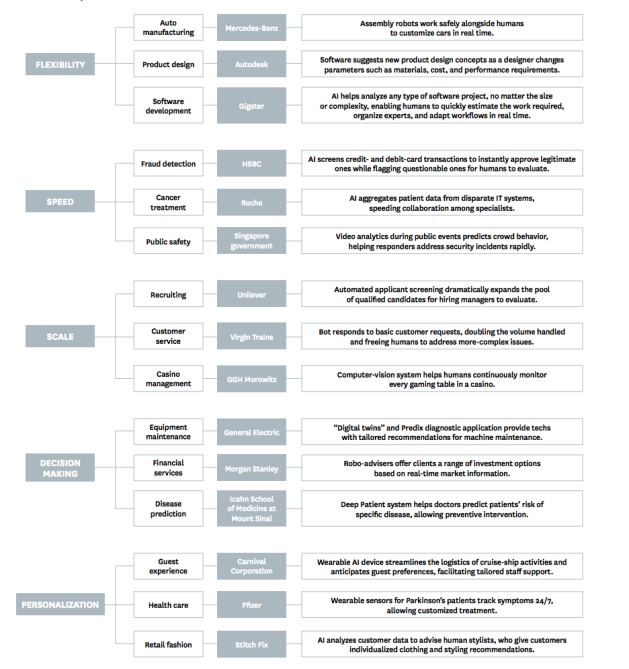This weeks blog post will have a specific focus on the supply chain industry, and how AI intends to compliment as well as improve the industries work.
There have been warnings, fears and presumptions over the past two centuries which highlight the underlying worry that automation will overtake majority of middle class jobs. Peter Hogg proposes that the implementation of A.I into the workplace is rising and through this implementation many people believe their jobs will become obsolete.
Well, I’m here to tell you otherwise.
It prevails that A.I will compliment the future of our jobs and its implementation will be more successful when carried out alongside humans. As stated in my previous post, humans are able to work alongside A.I to ensure collaborative work can occur. According to ‘Are Robots Taking Our Jobs?‘ by James Wilson and Paul Daugherty, “the total amount of work available had not decreased after the introduction of computer-based technologies”(Daugherty & Wilson 2018). They recall five principals that can help them become more collaborative when working alongside the technology, including:
- Reimagine business processes;
- Embrace experimentation/employee involvement;
- Actively direct AI strategy;
- Responsibly collect data; and
- redesign work to incorporate AI and cultivate related employee skills.
A survey carried out with 1,075 companies in 12 varying industries industries showed “that the more of these principles companies adopted, the better their AI initiatives performed in terms of speed, cost savings, revenues, or other operational measures” (Wilson & Daugherty 2018).

Moving forward with this idea in mind, it was of my upmost interest to uncover if employees are concerned about and more importantly what level of understanding they have on the topic. I endeavoured to interview an employee who works in supply chain for a medical manufacturing company to uncover his thoughts about A.I. I asked the following questions.
-
-
What do you know about AI?
- From what I have read AI isn’t here just yet, not in the traditional sense of a sentient being locked inside a computer…The end goal of current AI is to have you stay on their site for longer or spend more money.
-
What aspects of your job can be improved by AI?
- There are three main elements to my job – planning, system maintenance and communicating to sales. The biggest improvement AI could bring would be in the planning space…As a human, I make errors and can miss flags indicating I should increase or decrease stock levels. I imagine an intelligent AI could perform this task with ease, removing the human error and increasing service levels to customers.
-
How is AI incorporated into your job?
- Currently, it isn’t. We have low level planning systems that require human intervention. As with anything that requires human intervention, it is prone to mistakes and therefore can be improved.
-
What impact do you think AI will have on your job/overall company?
- An intelligent planning system (perhaps controlled by AI) could theoretically manage inventory globally without intervention by others. This would mean that all inventory planning positions in the world, as well as manufacturing planning could be made more efficient or removed…I imagine that the future of supply chain will see people working with AI to assist it, rather than programs assisting them in their job.
-
In the long term, where do you think we will be in regard to implementing AI into society/workforce?
-
I think the sci-fi version of AI is still a way off. I think that implementation of AI could improve efficiencies in some companies by reducing human error (and by reducing the number of humans)…Nick Bostrom titled ‘Superintelligence’ asks concerning questions about the introduction of AI and highlights that if the correct steps aren’t taken, the implementation of such technology might not be as beneficial as we’re led to believe.
Through the employees answers it is vital that supply chain workers are scared about the security of their jobs. This interview was provided to set the idea of how little awareness some employees have about A.I and how some of their fears could be seen as irrational once they have understood the benefits of the technology.
Thus, this blog post is to work as a tool of education for these employees, rather than another old blogpost.
Wilson and Daugherty outline ways that companies are able to get the most value from A,I, and their conclusion was that operations are to be redesigned. For this to be successful companies who are adopting the technology are to define an operation area that is able to be improved. From here, A.I will be implemented into that area of the workplace. Furthermore, companies must develop a solution through co-creation, which will see CEOs and employees envision how they will collaborate with the technology to improve company processes.
So how exactly are A.I. and robotics impacting Supply Chain?
- Recent research out of McKinsey finds, 61% of executives reported decreased costs and 53% report increased revenues as a direct result of introducing artificial intelligence into their supply chains.
- Robotics are being used to track and locate inventory within the warehouse to ensure supply chain work is completed more efficiently.
- A.I provides the supply chain with contextual information which can be used to reduce the operating costs and manage inventory.
The graph below show the change in the workforce in the past year (2018-2019) as a result of A.I implementation.

Evidently, the statistics above show the likelihood of the positive impact that this technology can have on companies. Through the following graph it is highlighted that “at organisations in all kinds of industries, humans and AI are collaborating to improve five elements of business processes” (Daugherty & Wilson 2018).

Overall, it is evident that A,I can have a positive impact on the supply chain workforce and place when implemented correctly. Companies see the biggest growth when humans and smart machines collaborate. Moving forward it is important ask, ‘when will this AI be implemented’ and furthermore ‘when will we be train to better comprehend these bots’.
References:
Hogg P, 2019, ‘Artificial intelligence: HR friend or foe?’, Strategic HR Review, vol. (18) no. (2) pp. (47-51)
(https://docs.google.com/document/d/19o4dlqrqpQpI9ea6jXVVFVtac_N4g_Z750lzuxo39kw/edit)
McKinsey & Company. 2020. Survey: AI adoption proves its worth, but few scale impact | McKinsey, (online) <https://www.mckinsey.com/featured-insights/artificial-intelligence/global-ai-survey-ai-proves-its-worth-but-few-scale-impact> (viewed: April 25 2020)
Wilson H J, Daugherty R P, 2018, Collaborative Intelligence: Humans and AI Are Joining Forces, Article Technology, Harvard Business Review